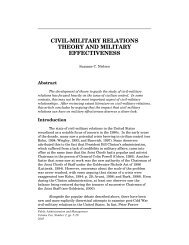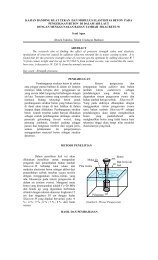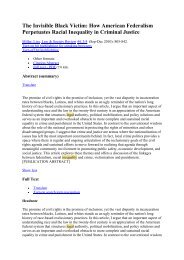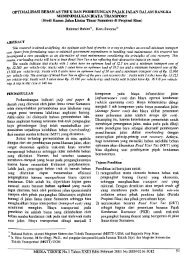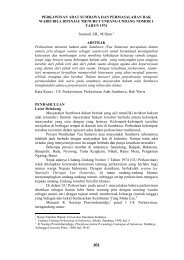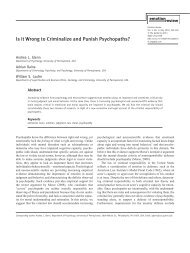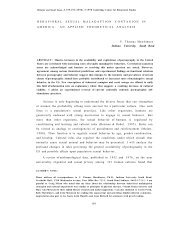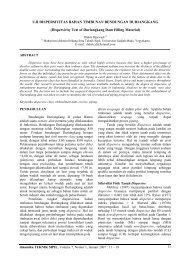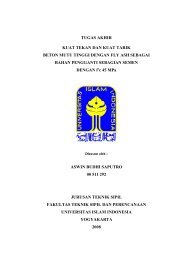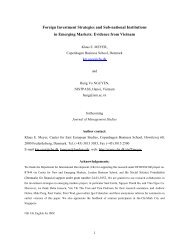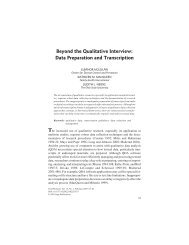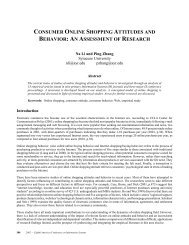Ski – resort and regional development: profile of visitors ... - E-Journal
Ski – resort and regional development: profile of visitors ... - E-Journal
Ski – resort and regional development: profile of visitors ... - E-Journal
You also want an ePaper? Increase the reach of your titles
YUMPU automatically turns print PDFs into web optimized ePapers that Google loves.
Tourist characteristics <strong>and</strong> dem<strong>and</strong> for tourism destination products in nigeria, tropical africa<br />
Official concern for tourism <strong>development</strong> in Nigeria started after the colonial period in 1975,<br />
following the establishment <strong>of</strong> Nigeria's Tourism Board (NTB). But because <strong>of</strong> political<br />
instability <strong>and</strong> lack <strong>of</strong> commitment by successive governments tourism has been neglected<br />
in the country (Ojo, 1985; Chokor, 1993). It was only recently in 1990 that a national tourism<br />
policy was formulated <strong>and</strong> adopted to guide tourism <strong>development</strong>s in Nigeria. However,<br />
several programmes for tourism <strong>development</strong> have within the past four decades (1960 - 1999),<br />
been pursued by various states <strong>and</strong> the Federal Governments <strong>of</strong> Nigeria. These were mostly<br />
in the areas <strong>of</strong> wildlife conservation, museum <strong>and</strong> archaeological site preservation, <strong>and</strong> hotel<br />
<strong>and</strong> physical site <strong>development</strong> in areas <strong>of</strong> outst<strong>and</strong>ing natural beauty or unique quality.<br />
Several constraints, however, have hindered these <strong>and</strong> other efforts to develop tourism in<br />
Nigeria. Prominent amongst which are limited supply <strong>and</strong> poor quality <strong>of</strong> tourism infrastructures,<br />
facilities <strong>and</strong> amenities. The nature <strong>of</strong> attractions that are highly dispersed over large areas<br />
particularly constitute serious transportation problem to tourists patronage. Additionally, poor<br />
transport linkage within tourists sites, low income earning <strong>of</strong> residents <strong>and</strong> poor ‘image’ <strong>of</strong><br />
the country as unsafe, <strong>and</strong> disturbed by political, ethnic, <strong>and</strong> religious crises <strong>and</strong> frequent<br />
military coups are all important constraints to tourism (Awaritefe, 2000). Consequently, though<br />
blessed with abundant <strong>and</strong> highly unique tourism resources, earnings from tourism have been<br />
low, about 3 percent <strong>of</strong> foreign travel in Africa (between 1998 <strong>and</strong> 2003) <strong>and</strong> insignificant<br />
(less than $.137 billion) when compared to $10 billion for other Third World African countries,<br />
majority <strong>of</strong> which are with less tourism resource endowment (WTO, 2001). There has been<br />
very few tourists’ arrival to Nigeria since 1972, the majority <strong>of</strong> whom are travellers on business,<br />
<strong>of</strong>ficial missions or visit friends/relations, mostly from Western Europe, America, South-East<br />
Asia, <strong>and</strong> neighbouring West African countries. Domestic tourism participation has also been<br />
low in Nigeria. An increasing number <strong>of</strong> educated <strong>and</strong> high income Nigerians <strong>and</strong> students<br />
provides an important source <strong>of</strong> the domestic tourists that visit the tourism destinations,<br />
especially the national parks, historic sites <strong>and</strong> cultural centers (Awaritefe, 1993, 2003).<br />
However, with the inception <strong>of</strong> a new democratic government in 1999, the Federal <strong>and</strong> several<br />
state governments have indicated keen interest to develop the tourism industry in the first<br />
decades <strong>of</strong> this millennium (Federal Government <strong>of</strong> Nigeria, 2002). The country is thus<br />
presented with challenges associated with growing public <strong>and</strong> private sector desires to develop<br />
the tourism industry. It is in the context <strong>of</strong> this scenario, the dilemma <strong>of</strong> a country with<br />
abundant tourism resources, yet experiencing low gains that this study aims to provide greater<br />
underst<strong>and</strong>ing <strong>of</strong> the nature <strong>of</strong> factors that determine tourism product dem<strong>and</strong>. This step is<br />
important so that desired tourist markets <strong>and</strong> products can be articulated <strong>and</strong> realised in<br />
subsequent tourism destination <strong>development</strong> or rejuvenation programmes in Nigeria.<br />
Tourism Today - Fall 2007 - Full Paper<br />
83



